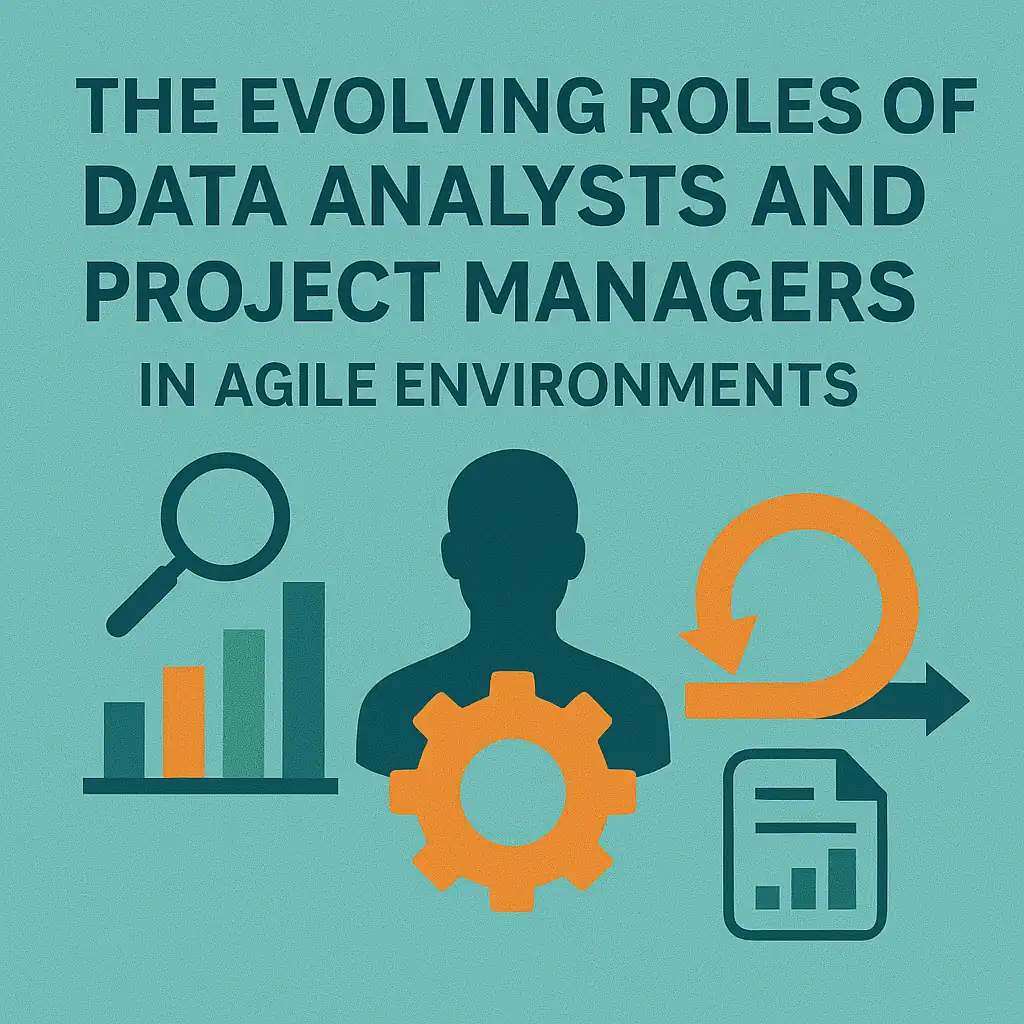Introduction
The roles of data analysts and project managers are increasingly intertwined, particularly within Agile environments.
- Defining the Roles: Data analysts are professionals who explore and interpret complex data sets to inform business decisions, providing insights that drive strategy and operational efficiency. On the other hand, project managers are responsible for planning, executing, and closing projects, ensuring that they meet stakeholder expectations and are delivered on time and within budget. Both roles are pivotal in their respective domains, yet they are evolving in response to the demands of Agile methodologies.
- Significance of Agile Methodologies: Agile methodologies have revolutionized project management by promoting flexibility, collaboration, and a customer-centric approach. These frameworks, such as Scrum and Kanban, emphasize iterative progress, allowing teams to adapt to changing requirements and deliver value incrementally. This shift has not only enhanced project outcomes but has also necessitated a reevaluation of traditional roles within project teams.
- Evolving Roles in Agile Environments: As Agile practices gain traction, the responsibilities of data analysts and project managers are transforming. Data analysts are increasingly integrated into project management teams, providing real-time insights that inform decision-making and prioritization. Meanwhile, project managers are adopting a more facilitative role, focusing on collaboration and communication to ensure that teams can respond swiftly to changes. This section will explore how these evolving roles contribute to the success of Agile projects, highlighting the importance of adaptability and effective communication in fostering a productive project environment.
Understanding Agile Methodologies
Agile methodologies have transformed the landscape of project management and data analysis, emphasizing flexibility, collaboration, and customer-centric approaches. Here’s a foundational understanding of agile principles and how they reshape the responsibilities of data analysts and project managers.
Overview of Agile Principles and Values
Agile methodologies are grounded in a set of core principles and values that prioritize individuals and interactions over processes and tools, working software over comprehensive documentation, customer collaboration over contract negotiation, and responding to change over following a plan. This framework encourages teams to focus on delivering value incrementally and iteratively, allowing for continuous improvement and adaptation throughout the project lifecycle.
Iterative Nature of Agile
One of the defining characteristics of agile is its iterative approach. Projects are broken down into smaller, manageable units called iterations or sprints, which typically last from one to four weeks. This structure allows teams to:
- Collaborate Effectively: Agile promotes regular communication among team members, stakeholders, and customers, ensuring that everyone is aligned and can provide feedback throughout the project. This collaboration is crucial for both data analysts and project managers, as it helps them understand evolving requirements and adjust their strategies accordingly.
- Incorporate Customer Feedback: By delivering work in short cycles, teams can gather feedback from customers early and often. This responsiveness ensures that the final product meets user needs and expectations, which is particularly important for data analysts who must present insights that are relevant and actionable.
Encouraging Adaptability and Responsiveness to Change
Agile methodologies inherently embrace change, recognizing that requirements may evolve as projects progress. This adaptability is vital for both data analysts and project managers:
- Data Analysts: In an agile environment, data analysts must be prepared to pivot their analyses based on new information or shifting project goals. Their ability to quickly adapt to changes in data requirements or project scope is essential for delivering timely insights that drive decision-making.
- Project Managers: Similarly, project managers must be agile in their approach to managing resources, timelines, and stakeholder expectations. They are tasked with facilitating a responsive environment where teams can adjust their plans based on real-time feedback and changing priorities.
The Role of Data Analysts in Agile Environments
In Agile frameworks, the role of data analysts has undergone significant transformation. Traditionally, data analysts were primarily focused on exploring existing data sources, interpreting data, and providing insights to inform decision-making processes. Their responsibilities often included:
- Data Exploration: Analyzing existing data sources to understand their structure, content, and semantics.
- Information Interpretation: Turning complex data from multiple sources into actionable information for decision-makers within the organization [1].
- Reporting: Generating periodic reports to summarize findings and support project objectives.
However, as Agile methodologies have gained traction, the responsibilities of data analysts have evolved to meet the demands of faster-paced project environments. Here are some key changes in their roles:
- Real-Time Data Analysis: Agile teams require immediate insights to make quick decisions. Data analysts are now expected to perform real-time data analysis, enabling teams to respond swiftly to changing project dynamics and stakeholder needs. This shift emphasizes the need for analysts to be adept at using tools and technologies that facilitate rapid data processing and visualization [11].
- Enhanced Reporting: Instead of static reports, data analysts are increasingly tasked with providing dynamic dashboards and visualizations that reflect the current state of projects. This allows Agile teams to monitor progress and performance metrics continuously, fostering a more responsive approach to project management [11].
- Collaboration with Cross-Functional Teams: In Agile environments, data analysts must work closely with cross-functional teams, including project managers, developers, and business analysts. This collaboration is crucial for ensuring that data-driven insights align with project goals and stakeholder expectations. Analysts are now seen as integral members of Agile teams, contributing to discussions and decision-making processes rather than merely providing background support [12].
- Stakeholder Engagement: The role of data analysts has expanded to include direct engagement with stakeholders. They are now expected to communicate findings effectively, translating complex data insights into understandable terms for non-technical stakeholders. This shift enhances the overall decision-making process and ensures that data-driven strategies are aligned with business objectives [12].
The Role of Project Managers in Agile Frameworks
The transition from traditional methodologies to agile frameworks has significantly reshaped the responsibilities and expectations of project managers. Understanding this evolution is crucial for agile practitioners who aim to navigate the complexities of modern project environments effectively.
Traditional Project Management Roles and Methodologies
Traditionally, project management has been dominated by methodologies such as Waterfall, which emphasize a linear and sequential approach to project execution. In this model, project managers are primarily responsible for:
- Planning and Scheduling: Creating detailed project plans that outline timelines, resources, and deliverables.
- Monitoring and Controlling: Overseeing project progress against the plan, managing risks, and ensuring adherence to budgets.
- Reporting: Providing stakeholders with updates and documentation throughout the project lifecycle.
This conventional approach often places project managers in a directive role, where they are seen as the primary decision-makers and controllers of the project process.
Shift to Servant Leadership and Facilitation
With the adoption of agile methodologies, the role of project managers has evolved towards a more collaborative and facilitative approach. Agile frameworks, such as Scrum, emphasize the importance of servant leadership, where project managers (often referred to as Scrum Masters in this context) focus on:
- Empowering Teams: Encouraging team autonomy and self-organization, allowing team members to take ownership of their work.
- Facilitating Communication: Ensuring open lines of communication among team members and stakeholders, fostering a culture of transparency and collaboration.
- Removing Obstacles: Actively identifying and addressing impediments that hinder the team’s progress, thereby enabling smoother workflows.
This shift reflects a fundamental change in mindset, where project managers are no longer seen as authoritative figures but rather as enablers who support their teams in achieving project goals.
Embracing Flexibility and an Agile Mindset
In agile environments, the need for project managers to embrace flexibility and an agile mindset is paramount. This involves:
- Adapting to Change: Recognizing that change is a constant in agile projects and being prepared to pivot strategies and plans as necessary.
- Continuous Learning: Committing to ongoing professional development and staying informed about agile practices and tools that can enhance team performance.
- Fostering a Culture of Innovation: Encouraging experimentation and iterative improvement, allowing teams to learn from failures and successes alike.
By adopting these principles, project managers can effectively lead their teams through the dynamic landscape of agile project management, ensuring that they remain responsive to both project demands and stakeholder needs.
Synergy Between Data Analysts and Project Managers
The roles of data analysts and project managers are increasingly intertwined, fostering a collaborative environment that enhances project outcomes. This section delves into the evolving responsibilities of both roles and emphasizes the importance of their synergy in Agile methodologies.
Importance of Data-Driven Decision-Making in Agile Projects
Data-driven decision-making is a cornerstone of Agile project management. Agile teams thrive on the ability to adapt quickly to changing circumstances, and data analysts play a pivotal role in this process. By analyzing project metrics and performance data, data analysts provide actionable insights that inform project managers’ decisions. This reliance on data helps teams to:
- Identify Trends and Patterns: Data analysts can uncover trends in project performance, enabling project managers to make informed adjustments to strategies and resource allocation.
- Enhance Predictability: With accurate data analysis, project managers can better forecast project timelines and outcomes, leading to more reliable planning and execution.
- Facilitate Continuous Improvement: Data-driven insights allow teams to reflect on past performance, identify areas for improvement, and implement changes that enhance future project efficiency.
Insights from Data Analysts that Enhance Project Management Strategies
Data analysts contribute significantly to the strategic planning and execution of Agile projects. Their expertise in interpreting data can lead to improved project management strategies in several ways:
- Risk Management: By analyzing historical data, data analysts can help project managers identify potential risks early in the project lifecycle, allowing for proactive mitigation strategies.
- Resource Optimization: Data insights can reveal how resources are being utilized, enabling project managers to optimize team performance and allocate resources more effectively.
- Stakeholder Engagement: Data analysts can provide insights into stakeholder behavior and preferences, helping project managers tailor their communication and engagement strategies to meet stakeholder needs.
Challenges Faced by Data Analysts and Project Managers
In the context of agile environments, both data analysts and project managers encounter unique challenges that can impact their effectiveness and the overall success of projects. As agile methodologies continue to evolve, understanding these challenges is crucial for agile practitioners aiming to optimize team dynamics and project outcomes.
Data Quality and Availability Issues
One of the primary challenges faced by data analysts is ensuring data quality and availability. In agile settings, where rapid iterations and quick decision-making are essential, the integrity of data becomes paramount. Analysts often deal with:
- Incomplete Data: Missing information can lead to skewed results, making it difficult to derive actionable insights. This is particularly problematic in fast-paced environments where decisions must be made swiftly [9].
- Inaccurate Data: Errors in data entry or inconsistencies can mislead project managers and stakeholders, resulting in misguided strategies and objectives [9]. The reliance on accurate data is critical for both roles, as project managers depend on these insights to guide project direction and resource allocation.
Aligning Project Goals with Data Insights
Another significant challenge is the alignment of project goals with the insights derived from data analysis. Data analysts must ensure that their findings are not only accurate but also relevant to the project’s objectives. This alignment can be difficult due to:
- Lack of Clear Goals: Agile projects often evolve, leading to shifting priorities. Without well-defined goals, data analysts may struggle to provide insights that directly support project outcomes [11].
- Communication Gaps: Effective communication between data analysts and project managers is essential. Misunderstandings can arise if project managers do not fully grasp the implications of the data presented, leading to decisions that do not align with the analytical insights [13].
Potential Role Conflicts or Misunderstandings
In agile teams, the roles of data analysts and project managers can sometimes overlap, leading to potential conflicts or misunderstandings. These issues may manifest in several ways:
- Role Clarity: Agile environments often promote cross-functional teams, which can blur the lines between roles. Data analysts may find themselves involved in project management tasks, while project managers might delve into data analysis, leading to confusion about responsibilities [6].
- Collaboration Challenges: Effective collaboration is essential for agile success. However, differing priorities and perspectives can create friction between data analysts and project managers, particularly when it comes to interpreting data and making decisions based on it [12].
Future Trends in Agile Data Analysis and Project Management
As Agile methodologies continue to evolve, the roles of data analysts and project managers are undergoing significant transformations. This section explores how emerging technologies, enhanced collaboration tools, and evolving project management frameworks are reshaping these roles in Agile environments.
Impact of Emerging Technologies
- Artificial Intelligence and Machine Learning: The integration of AI and machine learning into data analysis is revolutionizing how data analysts operate. These technologies enable analysts to process vast amounts of data more efficiently, uncovering insights that were previously difficult to identify. This shift allows data analysts to focus on strategic decision-making rather than merely data collection and reporting, enhancing their role in Agile teams [2][8].
- Data-Driven Decision Making: Agile teams are increasingly adopting data-driven practices, which are becoming a cornerstone of project management. This trend emphasizes the importance of metrics and analytics in guiding project decisions, thereby elevating the role of data analysts as key contributors to project success. As project managers rely more on data insights, the collaboration between these two roles will deepen, fostering a more integrated approach to project execution [3][5].
Enhanced Collaboration Tools and Techniques
- Collaboration Platforms: The rise of advanced collaboration tools is facilitating better communication and teamwork among Agile practitioners. Tools that integrate data visualization and real-time analytics allow project managers and data analysts to work together more effectively, ensuring that data insights are readily available for decision-making. This synergy is crucial in Agile environments, where rapid iterations and adaptability are essential [6][13].
- Cross-Functional Teams: Agile methodologies promote the formation of cross-functional teams, where data analysts and project managers collaborate closely. This structure encourages knowledge sharing and fosters a culture of continuous improvement. As these teams become more common, the boundaries between the roles may blur, leading to a more holistic approach to project management that leverages data insights throughout the project lifecycle [9][12].
Evolution of Project Management Frameworks
- Data-Driven Project Management: The future of project management frameworks is likely to accommodate data-driven approaches more explicitly. As organizations recognize the value of data in guiding project outcomes, frameworks will evolve to incorporate data analysis as a fundamental component. This shift will require project managers to develop a deeper understanding of data analytics, enabling them to make informed decisions based on real-time data [4][10].
- Agile Metrics and Performance Evaluation: The emphasis on metrics in Agile project management is expected to grow, with a focus on evaluating team performance and project success through data analysis. This trend will necessitate that both data analysts and project managers become proficient in interpreting and utilizing metrics to drive project outcomes. As a result, training and development in data literacy will become increasingly important for project managers [6][11].
Conclusion
The roles of data analysts and project managers are increasingly intertwined, each contributing uniquely to the success of projects. As agile methodologies promote adaptability and customer-centric approaches, understanding the evolving responsibilities of these roles becomes essential for agile practitioners.
- Importance of Both Roles: Data analysts play a crucial role in interpreting data and providing insights that inform decision-making, while project managers ensure that projects are delivered on time and within scope. Together, they create a synergy that enhances project outcomes, making their collaboration vital in agile environments [3][12].
- Fostering Collaboration: Agile practitioners are encouraged to cultivate a collaborative atmosphere between data analysts and project managers. This partnership not only streamlines communication but also aligns project goals with data-driven insights, ultimately leading to more informed strategies and successful project execution [11][14].
- Embrace the Evolution: As the roles of data analysts and project managers continue to evolve, it is imperative for agile practitioners to embrace these changes. By recognizing the shifting responsibilities and leveraging the strengths of both roles, teams can maximize project success and adapt to the ever-changing demands of the business landscape [10][12].
Find out more about Shaun Stoltz https://www.shaunstoltz.com/about/.
This post was written by an AI and reviewed/edited by a human.



